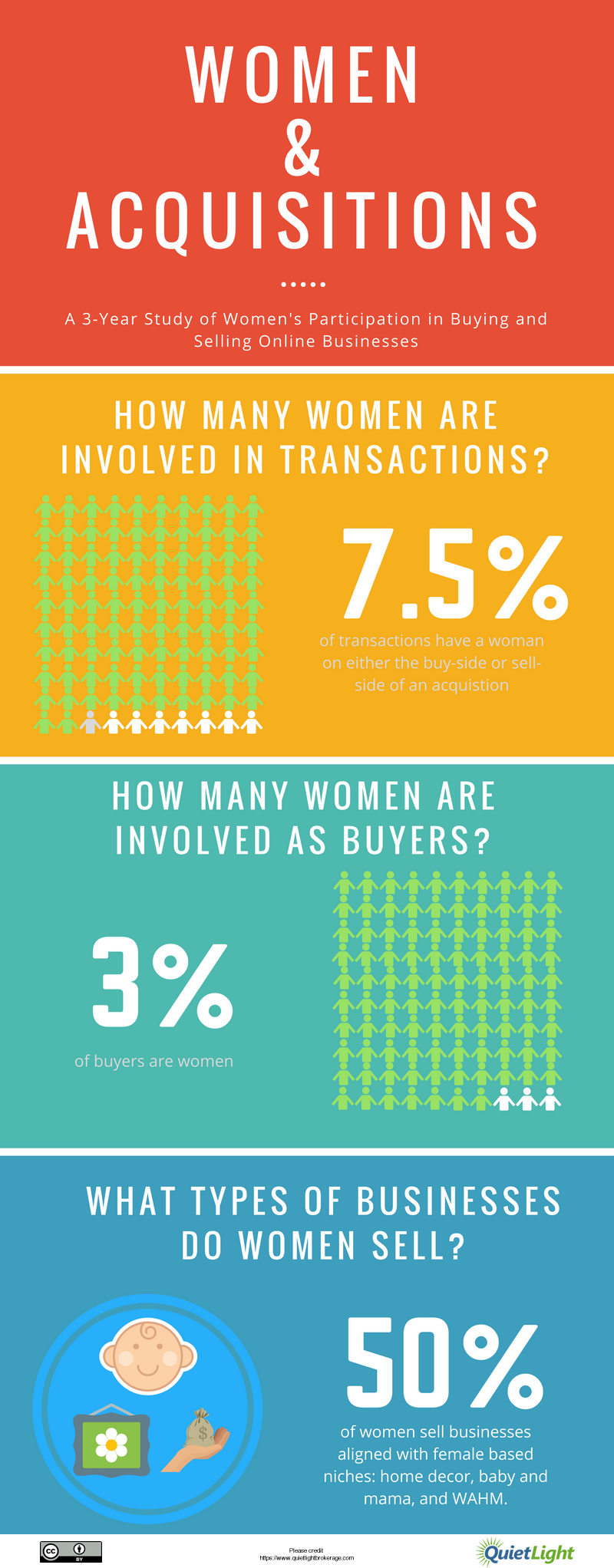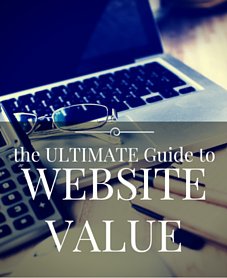Topics:
Never Miss a Beat - Get Updates Direct to Your Inbox
FILTER:


Why Are So Few Female Entrepreneurs Buying Online Businesses?
By Quiet Light
While women still make up only 36% of the entrepreneurship landscape, this number is on the rise. Since 2007, the number of female entrepreneurs has grown 30%.
Yet while this number is pointing in the right direction, the number of women who consider growing their business through acquisitions seems almost impossibly low.
We ran a study over the last 3 years of our transactional data to see just how involved women are in entrepreneurship, and particularly acquisitions. What we found was that only 8.5% of our buyers or sellers are women. If we narrow that statistic to merely buying online businesses, that 8.5% drops to just 3%. Online women entrepreneurs are also following certain stereotypes in that their companies by mainly selling in traditional female niches such as babies, home decor, or working at home.
These numbers also include husband and wife teams (which account for 20% of the transactions in which women are involved).
So what’s behind the lagging participation in acquisitions by women? Why don’t the number of women acquirers (or sellers) match the broader number of women entrepreneurs?


How One Women’s Business Coach Sees This Issue


I’m not the kind of person to talk about subjects I know nothing about. And since 91.5% of the people I work with are men (according to our study), it seemed to make sense to look to someone who works much more with women entrepreneurs.
That person would be Kat Loterzo, a personal coach for entrepreneurs. Kat is a no-nonsense, tell-it-like-it-is coach who is also extremely successful in her own right.
In Kat’s opinion, many female entrepreneurs focus on the wrong things. While the men she works with tend to be more oriented towards finding the fastest path to viability and profitability, a lot of her female clients get wrapped up in things that are less important. This can be seen in entrepreneurship groups that cater towards women.
“There is a bit of a rainbows and unicorns type feeling around the land of female entrepreneurship”, Kat explained. “You’re going to end up in this world of women who are talking about ‘What color should I make the picture on my website?’ or ‘What do you think of my new photos?’.
“But when I go into male entrepreneurship groups the focus is much more from the get-go on ‘What do I need to do to get this monetized?’ rather than ‘First I’m going to spend $20k or $30k on a website or photoshoot’ or pretty much nothing of substance.”
Buying An Online Business Is ROI-Driven


If Kat is right when she says that men’s groups focus more on monetization and business viability, while many women focus on aesthetics, it really shouldn’t come as a surprise that fewer women look towards acquisitions to grow their business ventures. After all, an acquisition revolves around the ‘fastest path to monetization’ attitude and much less on the ‘rainbows and unicorns’ type feelings that Kat repeatedly described in our conversation.
But while the general focus of men vs. women in entrepreneurship might explain some of the reasons women are less likely to participate in online acquisitions, I think there may be additional and deeper factors at play.
Fear, Support, & Echo Chambers
It’s not just a love for aesthetics that drives women to focus more heavily on that aspect of their businesses rather than the bottom line. Fear and hesitation also play a major role in this behavior.
From Kat’s observations, while men and women both face fear in their businesses, her male clients seem to be more ready and willing to put that fear aside and begin the actual work.
Fear is not as much of a thing with men as it is with women,” Kat explained. “Men seem to understand that if you want to be serious in business, you need to put your fear aside and do the work…whereas women understand that logically, but unfortunately their fear and their uncertainties rule them unless they take the effort to understand it and address it”.
This observation can be seen in the types of businesses women own as well. Women tend to gravitate more heavily towards “women-centric” businesses. In reviewing our transactions, 50% of female-owned businesses that sold would be considered “women-centric” (with focuses on home decor, baby & mama, work at home moms, recipes, etc).
There was no such strong trend among men.
It’s not that women are particularly passionate about these topics either, although some may be. “I don’t personally think that all these women are so passionate about selling baby products”, Kat explained. “I think that it’s an obvious step if it’s an area that you understand. It’s a safer choice.”
Kat explained that in her coaching, this “safer choice” was a common problem she experienced among her clients. Her clients would find ways to delay following their dreams out of a fear of negative experiences. She finds a lot of self-doubt and questioning among those clients.
This self-doubt drives many of these entrepreneurs to compromise their dreams by gravitating towards patterns that are more comfortable – niches that they may understand better, entrepreneurship groups that focus on business elements that are less important than fundamental business viability, or, in the case of acquisitions, avoiding that discussion altogether.
So Do Women Need To ‘Man Up’?
It might be tempting to read all this and infer that the general message from Kat is that women need to become more like men.
But don’t tell that to Kat. “I’m not of the mindset that women need to become more like men in business. Women do need to harden up – a lot – in business. I think women who are committed, and women who are quite ruthless in their ambition, but who also allow themselves to use their natural intuition, can be quite a powerful combination.”
So it is not that women need to become something they are not. Rather, the advice, the coaching, and the support that women get to pursue their entrepreneurial visions need to be adjusted.
This would explain why there seems to be a lag in women who are involved in acquisitions as well. While female entrepreneurship is on the rise, and female entrepreneurship groups are experiencing growth, the message to women generally avoids paths that can lead to a faster viability and stronger earnings. Thus, not as many women even look to acquisitions as a way to participate in entrepreneurship.
Looking For Role Models
While more and more women look to entrepreneurship as a career path, too few look to acquisitions. I am personally confident that this will change, but we need role models. Too many women are getting bad advice from other women, and too few consider acquisitions as a valid entrepreneurship choice.
But this can change if our industry finds those women who are currently seeing success in the acquisitions game. With more role models to look towards, I’m confident we will see a growth in the number of women who consider acquisitions as a viable path for entrepreneurship.
Comments are closed.






I’ve discussed business with quite a few female sellers in the past 3 years and they all seemed to be pretty cool to deal with. And yes their business models were more like rainbows and unicorns… gossip/entertainment stuff, coupons, coupons, coupons… Nonetheless they all understood the selling process and their expectation were all pretty reasonable and within the market limits.
As a female buyer and seller of offline and online businesses (not a broker), I think there is more to it. For online businesses in particular, there can be a significant perceived technical barrier. And, we’ve all seen the female STEM numbers in the US, and it’s not pretty.
Most of the online entrepreneurs I know are men. Most have substantial technical chops, OR have the network already established that they know where to go to find what they need. I have a male business partner that fulfills some of that role and participates in the same networks I do. I cannot think of a single woman I know that could replace what he does or has the same curiosity and willingness to experiment that he exhibits, sadly.
Are we both gutsy, heck yeah. In fact, me more than he. But, if I had to “go it alone” and find and foster online businesses, I’d feel out of my technical depth in a heart beat. And perhaps this is the risk aversion portion of what Kat was saying, I might let that stop me. Not because of a preference for traditionally female type products and services, but because I have never been taught that I can manage what I don’t understand. Women (yes, I’m about to generalize) have a stronger need to be true SME’s than their male counterparts, I think, and not just bull their way through. That can be very hampering, because you can never learn everything, and certainly not fast enough to stay nimble in a changing marketplace.
Lastly, the same wonderful network I mentioned earlier that provides technical know how and tools and tricks, also provides access to opportunities for capital and deal flow. If you aren’t in, you don’t know. And if you don’t know, you can’t do. I sing a happy song in my heart every time I go to Rhodium Weekend (for example) and see a female face. Oo another one, I think. And, it makes me smile.
Thanks for taking this on, Mark. I can’t wait to read more and see how things shift over the years.